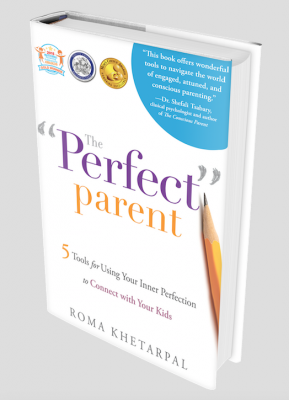By Roma Khetarpal
Grades—Expect Them or Accept Them?
With school back in full swing, grades and the expectations attached to them can easily strain the parent-child relationship and affect a child’s academic performance in the long run.
So when your child gets a grade that you are disappointed about, before you say anything, commit to an open-minded and openhearted approach. As research by the pioneer of Emotional Intelligence, Dr. Daniel Goleman, reminds us: Managing emotions first is the road map to emotional intelligence, effective communication, and a child’s academic and life success.
Start by what I call “Dealing with the Feeling”—spot it, say it, okay it.
- Identify the feeling (spot it, say it). Ask your kids:
How do they feel about the grade?
Help them say it out loud. If they are unable to verbalize their feelings, help them with the emotional vocabulary.
If they say they feel “bad,” help them break that down to a real emotion:
- Are you angry at yourself?
- Are you sad that didn’t get a good grade?
- Are you afraid that Mommy (and/or Daddy) will be angry with you?
- Validate the feeling (okay it).
- I understand how you feel. I would be angry, too.
- When I got a bad grade in science in fourth grade, I was really sad.
- When I was in school, I also used to be afraid to share my bad grades with my Mom and Dad.

This step helps turn down the volume of emotions. When emotions are validated, children are less likely to be defensive. Now you can access the child’s intellect and …
- Connect the dots and explore their underlying thoughts by being the calm and kind voice of reason.
- Why do you think you got that grade?
If the child answers, “I don’t know,” offer some suggestions.
- Do you think you didn’t try hard enough, and that makes you angry?
- Did you try hard but still didn’t get a good grade, and that makes you sad?
Emotions sometimes take time to dissipate. If your child is not ready to talk about it, be okay with that. When stifled or bypassed quickly, emotions have a much higher likelihood of finding an alternate exit. If your child starts to cry, give him or her a giant bear hug and say that it’s okay to cry or be sad. Offer to discuss the issue later. Keep your eye on the ball—the lesson to be learned. And that will not happen with emotions in the way.
Accessing the intellect and reasoning allays defensive arguments. And when we reason, we are more likely to respond instead of react. The difference: Reactions are impulsive and stem from emotions, while responses are thought out and stem from the intellect. That said, reasoning requires emotions to be balanced. Allowing time to process emotions is the key to effective communication.
Always keep in mind—and let your kids know—that getting a bad grade does not mean that they are “bad” kids. Reassure children that grades do not define them. Grades are simply a measure of how someone did on a particular test on a particular day. Taking the pressure off helps children feel better so they can do their best to reach their individual potential.
Most importantly, refrain from comparing a child to a sibling or friend. That lowers self-esteem and opens the door to feelings of rejection—hardly the goal of communicating openly and building connections and relationships with our kids!
Says Michael J. Fox, “My happiness grows in direct proportion to my acceptance and in inverse proportion to my expectations.”
So let’s commit to accepting our kids and their grades rather than emphasizing our expectations. It will make you a happier parent raising a happier child!
About the Author:
 Roma Khetarpal is Masalamommas parenting columnist. She is the founder and CEO of Tools of Growth, through which she helps parents raise kids to “Be Happy, Think Positive, and Do Good.” With parenting classes, community outreach, articles, reviews, and blog posts, Tools of Growth provides parents with simple, easy-to-remember, and effective communication tools that can help them build a strong foundation and relationship with their children.
Roma Khetarpal is Masalamommas parenting columnist. She is the founder and CEO of Tools of Growth, through which she helps parents raise kids to “Be Happy, Think Positive, and Do Good.” With parenting classes, community outreach, articles, reviews, and blog posts, Tools of Growth provides parents with simple, easy-to-remember, and effective communication tools that can help them build a strong foundation and relationship with their children.
By synthesizing the themes and concepts of the personal growth and emotional intelligence fields, along with cutting-edge parenting research, Khetarpal delivers her message in an accessible, reassuring, and personally empowering way.
She is also the author of the “The ‘Perfect’ Parent: 5 Tools for Using Your Inner Perfection to Connect With Your Kids.” In “The ‘Perfect’ Parent,” Khetarpal writes that it’s the dynamic between parents and children that makes the difference. She writes that parents can draw on their inner resources — what she calls inner perfection — to enhance the way they connect with their children, building trust and thereby making it second nature for children to reach out to their parents, strengthening that bond for life.



There are no comments
Add yours